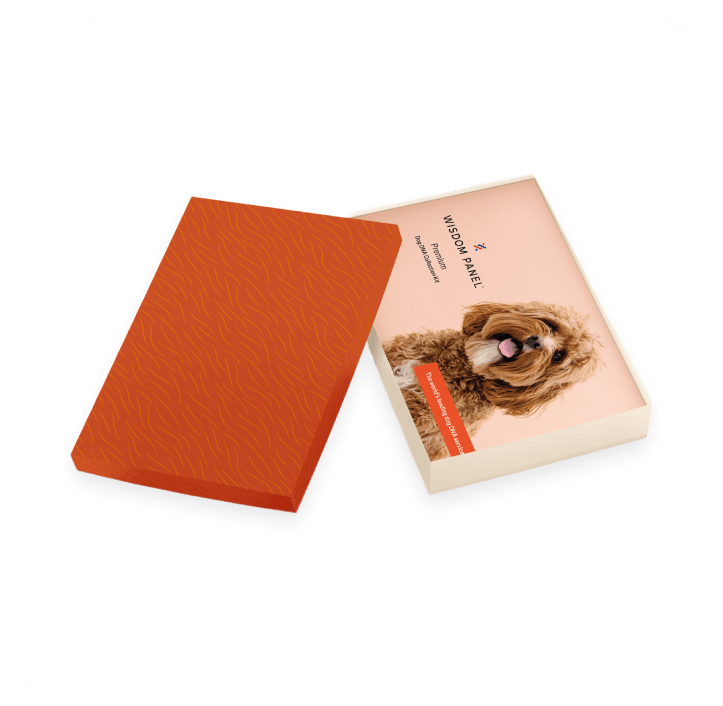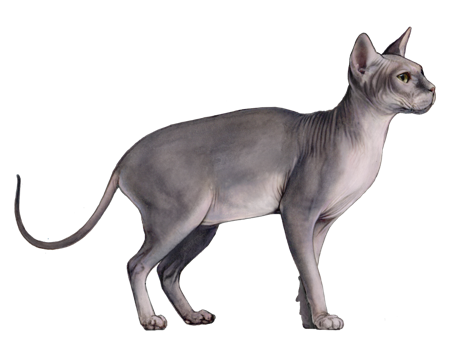
Maine Coon
The Maine Coon is a gentle giant. Equal parts rugged and beautiful, this breed makes a great family pet thanks to its gentle disposition and love of people.
Interested in discovering if your cat is a Maine Coon?
Check out Wisdom Panel's DNA test.
Maine Coon Traits
General Appearance
Maine Coons are large, stocky cats with shaggy coats that protect them in harsh weather. They have a robust, balanced appearance with good muscle tone, a broad chest, and substantial legs.
Coat and Coloring
The Maine Coon's dense, textured coat is short on the head, shoulders, and legs and longer down the back and sides. Long belly fur, shaggy trousers on their hind legs, and a frill around the neck protect them from the elements (and makes them pretty cute). Their tails are broad at the base and taper at the tip, though the shape can be hard to see beneath the long, flowing hair.
Maine Coons come in almost all colors and patterns, though the most common is the brown classic or mackerel tabby.
Distinctive Physical Traits
Maine Coons have medium-sized, square heads and prominent cheekbones. Their large, well-tufted ears are wide at the base and taper to a point. They have broad chests and bodies that are long but proportionate, with a rectangular appearance. One of their most notable features is their large, expressive oval eyes.
Maine Coon Temperament
Maine Coons are an excellent breed for families, as they often get along well with other cats, kids, and dogs. Because of their gentle nature and good-natured personality, they also make good therapy cats.
Though not generally the kind of cat that will curl up in your lap, Maine Coons do enjoy being around people. They like to hang out near their humans and will often follow them from room to room. They've earned a reputation as a friendly—but not overly demanding—companion. Maine Coons are also quiet cats that rarely meow. Instead, they'll get your attention with a soft (and endearing) chirp.
Unlike some other cat breeds, Maine Coons tend to stay on the ground rather than jump and climb to high places. This preference makes them great candidates for a game of fetch!
Maine Coon History
The Maine Coon's name is a nod to both the breed's history and appearance. A native of Maine (and the official state cat), the Maine Coon is one of the oldest cat breeds in North America. There are many myths about how the breed got its start, ranging from plausible to downright fanciful.
One favorite legend is that domestic cats mated with raccoons and produced a cat with a bushy tail and brown tabby coloring. Though this is genetically impossible, the breed's likeness to raccoons earned it the name Maine Coon. The most likely theory about the breed's origin is that shorthaired domestic cats mated with longhaired cats brought to the area by New England seamen or Vikings in the 1850s.
People favored Maine Coons for their rugged appearance and keen mousing skills. But their popularity skyrocketed when they became America's first native show cat. Their popularity faded in the mid-20th century—when other longhaired breeds arrived in the United States. In fact, Maine Coons bordered on extinction. Fortunately, dedicated breeders worked diligently to bring the breed back to its former glory.
Maine Coon Care
Nutrition
Maine Coons require a high-quality diet. Because nutritional needs vary for kittens, adults, and senior cats, take care to choose a formula that's age-appropriate for your pet. You might also consider diets designed specifically for the Maine Coon's unique needs.
Any cat can become overweight if they eat too much. To avoid overfeeding, carefully measure out your pet's food with a standard measuring cup and reduce portions if they gain weight. And don't overdo it on treats—no matter how many cute looks your cat gives you. As a guideline, treats should make up no more than 10% of their daily calories.
In addition to daily meals, make sure to provide plenty of fresh water for your cat at all times.
Grooming
The texture of a Maine Coon's coat impacts how often they require grooming. Cottony coats need daily brushing, while silky coats can go longer between grooming sessions. Regardless of the texture, all Maine Coons need regular grooming. On the plus side, this breed generally likes water and doesn't mind taking baths. (They're even pretty good swimmers!)
Maine Coons often enjoy the attention that comes with being groomed. But if you don't share the same enthusiasm for the grooming routine, you can keep your Maine Coon's coat in a short "lion cut" that doesn't require frequent brushing.
In addition to coat maintenance, be sure to trim your Maine Coon's nails regularly. For kittens, this means once a week. Adult cats can go up to three weeks between trims. Nails that get too long are more likely to snag on something and become torn or damaged. Overgrown nails can also grow into your cat's paw pads, leading to pain or infection. Besides clipping, providing a scratching post can help keep their nails in good shape and satisfy their instinct to scratch.
Dental care is also an essential part of any cat's overall health. So, don't delay in starting your Maine Coon on a dental program that includes at-home teeth brushing and professional exams and cleanings by a veterinarian.
Health
Because of their large size, Maine Coons can be prone to joint issues such as hip dysplasia. In addition to keeping your cat at a healthy weight, ask your veterinarian about supplements that may improve joint health.
Maine Coon Genetic Health Conditions
-
Cystinuria Type B (Variant 3)
Cystinuria is a condition that predisposes cats to form cystine crystals and stones within the urinary tract, which can then cause irritation and blockage.
-
Factor XII Deficiency (Variant 1)
Factor XII Deficiency, also known as Hageman trait, is an asymptomatic blood factor deficiency. While it does not cause an abnormal tendency to bleed, it can be observed as prolonged blood clotting times during certain laboratory screening tests.
-
Factor XII Deficiency (Variant 2)
Factor XII Deficiency, also known as Hageman trait, is an asymptomatic blood factor deficiency. While it does not cause an abnormal tendency to bleed, it can be observed as prolonged blood clotting times during certain laboratory screening tests.
-
Hypertrophic Cardiomyopathy (Discovered in the Maine Coon)
Hypertrophic Cardiomyopathy (Discovered in the Maine Coon) is a disorder in which the heart muscle wall increases in thickness, eventually leading to heart failure.
-
MDR1 Medication Sensitivity
MDR1 Medication Sensitivity is a disorder caused by a defect to a drug pumping protein that plays an important role in limiting drug absorption and distribution (particularly to the brain). Cats with the MDR1 variant may have severe adverse reactions to some commonly used medications.
-
Polycystic Kidney Disease (PKD)
Polycystic Kidney Disease (PKD) is the most common inherited disease in cats. The disease causes the formation of fluid-filled cysts in the kidneys that can lead to kidney failure.
-
Pyruvate Kinase Deficiency
Pyruvate Kinase (PK) Deficiency is a disorder that causes anemia due to the breakdown of red blood cells.
With more than 45 health tests, Wisdom Panel™ Complete for Cats screens for these and other important genetic conditions—allowing you to better plan for your cat's lifelong care.
Breed Group
Western
The largest of breed groups, the Western Group is mainly comprised of cats developed in Europe and the Americas. Due to the complexity of feline genetic diversity, however, cat breeds from other regions may also be found associated with this group.
Resources
https://tica.org/breeds/browse-all-breeds?view=article&id=853:maine-coon-breed&catid=79
https://cfa.org/maine-coon-cat/
http://www1.fifeweb.org/dnld/std/MCO.pdf
https://cfa.org/wp-content/uploads/2019/06/maine-coon-standard.pdf
https://tica.org/breeds/browse-all-breeds?view=article&id=1194:the-maine-coon-breed&catid=48
Reviewed February 23, 2021 by Jamie Freyer, DVM






































